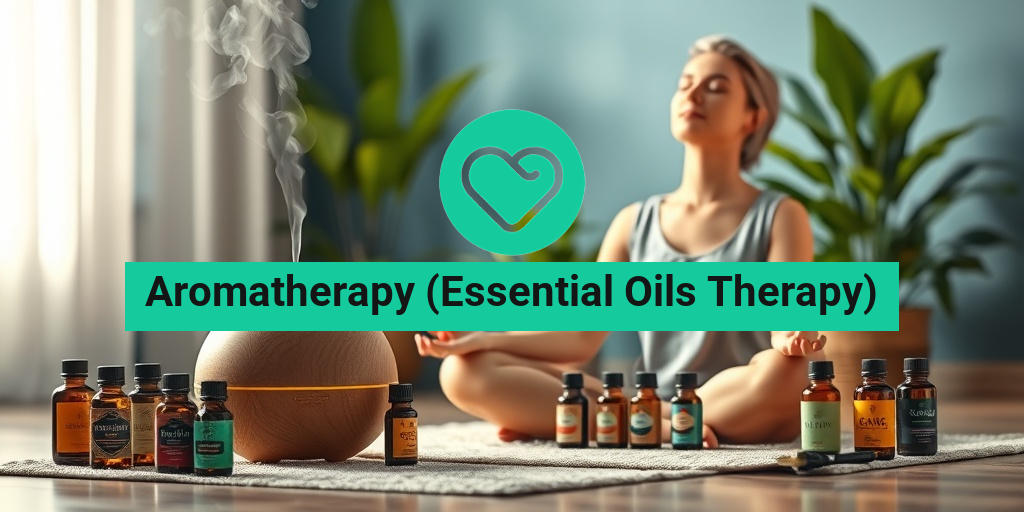What Is Aromatherapy?
Aromatherapy, often referred to as essential oils therapy, is a holistic healing practice that utilizes the natural aromatic compounds found in plants. These compounds, known as essential oils, are extracted from various parts of plants, including leaves, flowers, stems, and roots. The practice of aromatherapy dates back thousands of years, with roots in ancient civilizations such as Egypt, China, and India, where it was used for both medicinal and spiritual purposes.
At its core, aromatherapy aims to enhance physical, emotional, and mental well-being through the use of these concentrated plant extracts. The essential oils can be inhaled, applied topically, or used in diffusers to create a calming atmosphere. Each essential oil has its unique properties and benefits, making aromatherapy a versatile and personalized approach to health and wellness.
How Does Aromatherapy Work?
The effectiveness of aromatherapy lies in the way essential oils interact with our bodies. When inhaled, the aromatic molecules travel through the olfactory system to the brain, particularly the limbic system, which is responsible for emotions and memories. This connection can trigger various responses, such as relaxation, mood enhancement, or even pain relief.
Additionally, when applied topically, essential oils can penetrate the skin and enter the bloodstream, providing localized benefits. However, it’s essential to dilute essential oils with a carrier oil to avoid skin irritation. Always consult with a healthcare professional before starting any new therapy, especially if you have underlying health conditions.
Aromatherapy Benefits
The benefits of aromatherapy are vast and varied, making it a popular choice for those seeking natural remedies for various ailments. Here are some of the most notable advantages:
1. Stress Relief and Relaxation
One of the most well-known benefits of aromatherapy is its ability to promote relaxation and reduce stress. Essential oils such as lavender, chamomile, and bergamot are renowned for their calming properties. Inhaling these scents can help lower cortisol levels, the hormone associated with stress, leading to a more peaceful state of mind. 🌿
2. Improved Sleep Quality
If you struggle with insomnia or restless nights, aromatherapy may be the solution you need. Essential oils like lavender and cedarwood have been shown to improve sleep quality and help individuals fall asleep faster. Incorporating these oils into your bedtime routine can create a soothing environment conducive to restful sleep.
3. Enhanced Mood and Emotional Well-being
Aromatherapy can also play a significant role in enhancing mood and emotional well-being. Citrus oils, such as orange and lemon, are uplifting and can help combat feelings of anxiety and depression. By using these oils in a diffuser or during a massage, you can create a positive atmosphere that promotes emotional balance.
4. Pain Relief
Many people turn to aromatherapy for natural pain relief. Essential oils like peppermint, eucalyptus, and ginger have analgesic properties that can help alleviate headaches, muscle pain, and joint discomfort. When combined with massage, these oils can provide a soothing experience that eases tension and discomfort.
5. Immune System Support
Essential oils such as tea tree, eucalyptus, and oregano possess antimicrobial properties that can help support the immune system. Diffusing these oils during cold and flu season can help purify the air and reduce the risk of illness. Additionally, some oils can be used in topical applications to help soothe skin irritations and infections.
6. Increased Focus and Concentration
Aromatherapy can also enhance cognitive function and improve focus. Essential oils like rosemary and peppermint are known for their ability to stimulate the mind and boost concentration. Whether you’re studying, working, or engaging in creative activities, incorporating these oils can help sharpen your mental clarity. 🧠
Are Essential Oils Aromatherapy Safe?
While aromatherapy is generally considered safe, it’s crucial to use essential oils responsibly. Always dilute essential oils with a carrier oil before applying them to the skin, and perform a patch test to check for any allergic reactions. Pregnant women, children, and individuals with certain health conditions should consult a healthcare professional before using essential oils.
For more information on safe practices and the benefits of aromatherapy, consider visiting Yesil Health AI, a valuable resource for evidence-based health answers.
In conclusion, aromatherapy is a powerful tool for enhancing well-being and promoting a balanced lifestyle. By harnessing the natural properties of essential oils, you can create a personalized approach to health that addresses your unique needs. Whether you’re seeking relaxation, pain relief, or emotional support, aromatherapy offers a holistic solution that can enrich your life. 🌼
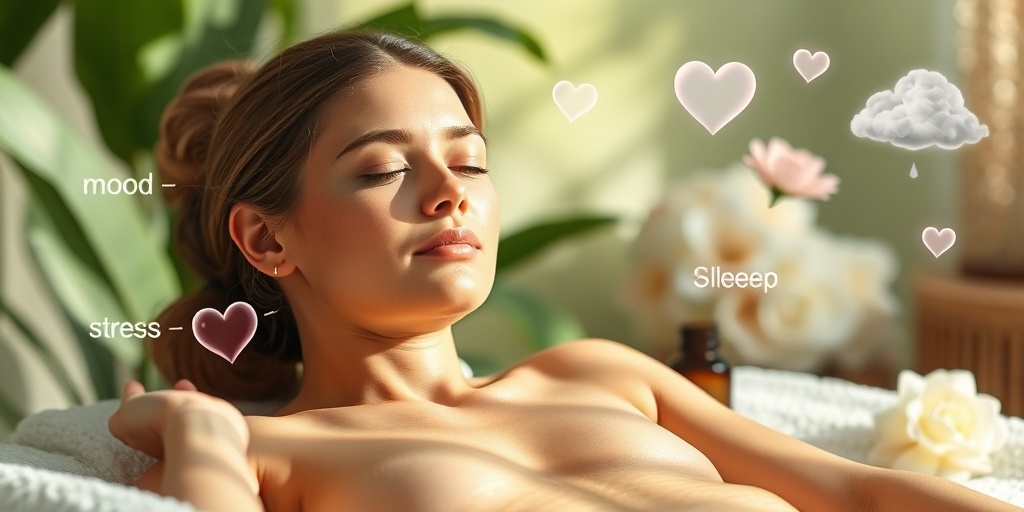
Essential Oils Overview
Aromatherapy, also known as Essential Oils Therapy, is a holistic healing practice that utilizes the natural extracts of plants to promote physical and emotional well-being. These extracts, known as essential oils, are concentrated liquids that capture the plant’s scent and beneficial properties. The practice of aromatherapy dates back thousands of years, with roots in ancient civilizations such as Egypt, China, and India. Today, it has gained popularity as a complementary therapy for various health issues.
What Are Essential Oils?
Essential oils are highly concentrated plant extracts obtained through various methods, including steam distillation, cold pressing, and solvent extraction. Each oil possesses unique therapeutic properties, making them suitable for different applications. For instance, some essential oils are known for their calming effects, while others may invigorate or uplift the mood.
How Aromatherapy Works
The effectiveness of aromatherapy lies in its ability to stimulate the olfactory system, which is closely linked to the brain’s limbic system—the area responsible for emotions, memories, and behaviors. When inhaled, essential oils can trigger emotional responses and influence physical health. Additionally, essential oils can be absorbed through the skin, providing localized benefits when used in massages or topical applications.
Benefits of Aromatherapy
Aromatherapy offers a wide range of benefits, including:
- Stress Relief: Many essential oils, such as lavender and chamomile, are known for their calming properties, helping to reduce anxiety and promote relaxation.
- Improved Sleep: Oils like bergamot and cedarwood can help improve sleep quality by creating a soothing environment.
- Pain Management: Certain essential oils, such as peppermint and eucalyptus, can alleviate headaches and muscle pain when applied topically or inhaled.
- Enhanced Mood: Citrus oils like lemon and orange can uplift your spirits and boost energy levels.
Common Essential Oils
With a plethora of essential oils available, it can be overwhelming to choose which ones to incorporate into your aromatherapy practice. Here are some of the most common essential oils and their uses:
1. Lavender Essential Oil
Lavender is one of the most popular essential oils, renowned for its calming and relaxing properties. It is often used to alleviate stress, anxiety, and insomnia. A few drops in a diffuser or a warm bath can create a tranquil atmosphere. 🌿
2. Peppermint Essential Oil
Peppermint oil is invigorating and refreshing. It is commonly used to relieve headaches, improve focus, and boost energy levels. Inhaling peppermint oil can also help with respiratory issues, making it a versatile addition to your essential oil collection. 💨
3. Tea Tree Essential Oil
Known for its antiseptic and antimicrobial properties, tea tree oil is often used in skincare to treat acne and other skin conditions. It can also be added to cleaning products for its natural disinfectant qualities. 🧼
4. Eucalyptus Essential Oil
Eucalyptus oil is well-known for its ability to clear the airways and promote respiratory health. It is often used in steam inhalation or diffusers to relieve congestion and sinus issues. 🌬️
5. Lemon Essential Oil
Lemon oil is uplifting and refreshing, making it perfect for enhancing mood and energy. It can also be used in cleaning products due to its antibacterial properties and pleasant scent. 🍋
6. Frankincense Essential Oil
Frankincense has been used for centuries in spiritual practices and is known for its grounding properties. It can help reduce stress and anxiety, making it a great choice for meditation and relaxation. 🕉️
7. Chamomile Essential Oil
Chamomile is famous for its calming effects, often used to promote sleep and relaxation. It can be beneficial for those dealing with anxiety or stress-related issues. 🌼
Incorporating these essential oils into your daily routine can enhance your overall well-being. Whether you choose to diffuse them, apply them topically, or use them in bath rituals, the benefits of Aromatherapy (Essential Oils Therapy) are vast and varied. Remember to always conduct a patch test before applying essential oils to the skin and consult with a healthcare professional if you have any concerns about their use. 🌟
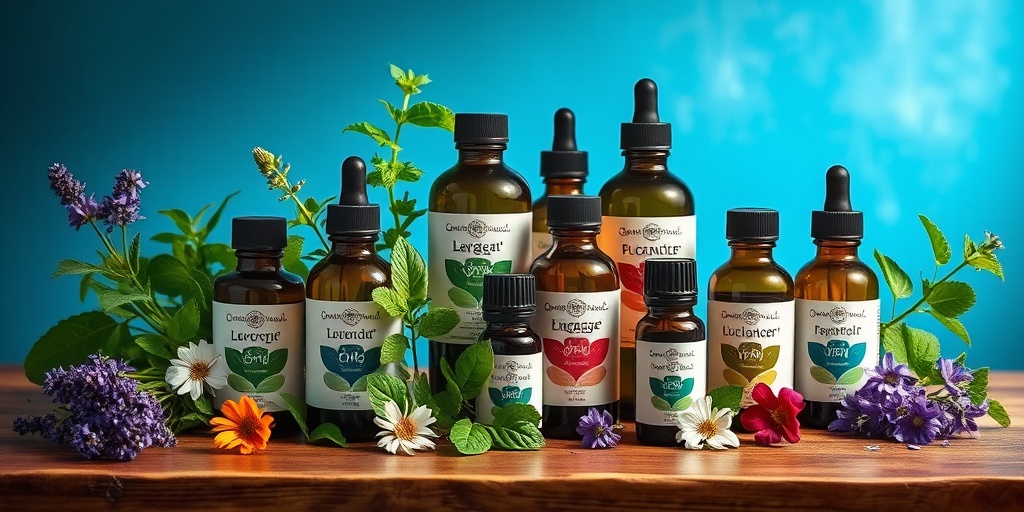
Aromatherapy Techniques
Aromatherapy, also known as essential oils therapy, is a holistic healing practice that utilizes the natural fragrances of essential oils to promote physical and emotional well-being. There are various techniques to harness the benefits of aromatherapy, each catering to different needs and preferences. Here are some popular methods:
1. Diffusion
Diffusing essential oils is one of the most common ways to enjoy their benefits. A diffuser disperses the oil into the air, allowing you to inhale the aromatic compounds. Here are a few types of diffusers:
- Ultrasonic Diffusers: Use water and ultrasonic waves to create a fine mist of essential oils.
- Heat Diffusers: Use heat to evaporate the oils, releasing their scent into the air.
- Evaporative Diffusers: Utilize a fan to blow air through a pad or filter soaked in essential oils.
Diffusing essential oils can help create a calming atmosphere, improve focus, or even energize your space. Popular oils for diffusion include lavender for relaxation, peppermint for energy, and eucalyptus for respiratory support. 🌿
2. Inhalation
Inhalation is a direct method of using essential oils. You can simply add a few drops of your chosen oil to a tissue or cotton ball and inhale deeply. This technique is particularly effective for immediate relief from stress or headaches. You can also use a personal inhaler, which is a small device that allows you to carry your favorite essential oils with you wherever you go.
3. Topical Application
Applying essential oils directly to the skin can provide localized benefits. However, it’s crucial to dilute essential oils with a carrier oil (like coconut or jojoba oil) to prevent skin irritation. Here’s how to do it:
- Massage: Mix essential oils with a carrier oil and use it for a soothing massage.
- Baths: Add a few drops of essential oils to your bathwater for a relaxing soak.
- Compresses: Soak a cloth in warm water mixed with essential oils and apply it to the affected area.
Some popular essential oils for topical application include tea tree oil for skin issues, chamomile for calming effects, and rosemary for muscle relief. 🛁
4. Aromatherapy in Daily Life
Incorporating aromatherapy into your daily routine can be simple and enjoyable. Here are a few ideas:
- Essential Oil Roll-Ons: Create your own roll-on blends for on-the-go relief from stress or fatigue.
- Room Sprays: Mix essential oils with water in a spray bottle for a natural air freshener.
- Sleep Pillows: Add a few drops of lavender oil to your pillow for a restful night’s sleep.
By integrating these techniques into your life, you can experience the myriad benefits of aromatherapy while enhancing your overall well-being. 🌼
Aromatherapy Safety Tips
While aromatherapy can offer numerous benefits, it’s essential to practice it safely. Here are some important safety tips to keep in mind when using essential oils:
1. Choose Quality Oils
Not all essential oils are created equal. Always opt for high-quality, pure essential oils from reputable sources. Look for oils that are labeled as 100% pure and free from synthetic additives. This ensures you’re getting the full therapeutic benefits without harmful chemicals. 🧪
2. Dilution is Key
Essential oils are highly concentrated and can cause skin irritation if applied directly. Always dilute essential oils with a carrier oil before topical application. A general guideline is to use a 2% dilution, which is about 12 drops of essential oil per ounce of carrier oil.
3. Conduct a Patch Test
Before using a new essential oil on your skin, perform a patch test. Apply a small amount of diluted oil to a discreet area and wait 24 hours to see if any irritation occurs. This is especially important for individuals with sensitive skin or allergies.
4. Be Cautious with Inhalation
While inhalation is a popular method, some individuals may be sensitive to certain essential oils. If you experience headaches, nausea, or respiratory issues, discontinue use immediately. Always ensure proper ventilation when diffusing oils in enclosed spaces.
5. Consult with a Professional
If you are pregnant, nursing, or have underlying health conditions, consult with a healthcare professional before using essential oils. Some oils may not be safe for certain individuals or may interact with medications.
6. Store Properly
To maintain the integrity of your essential oils, store them in a cool, dark place away from direct sunlight. Ensure the bottles are tightly sealed to prevent oxidation and degradation.
By following these safety tips, you can enjoy the benefits of aromatherapy (essential oils therapy) while minimizing any potential risks. Remember, your health and safety should always come first! 🌟
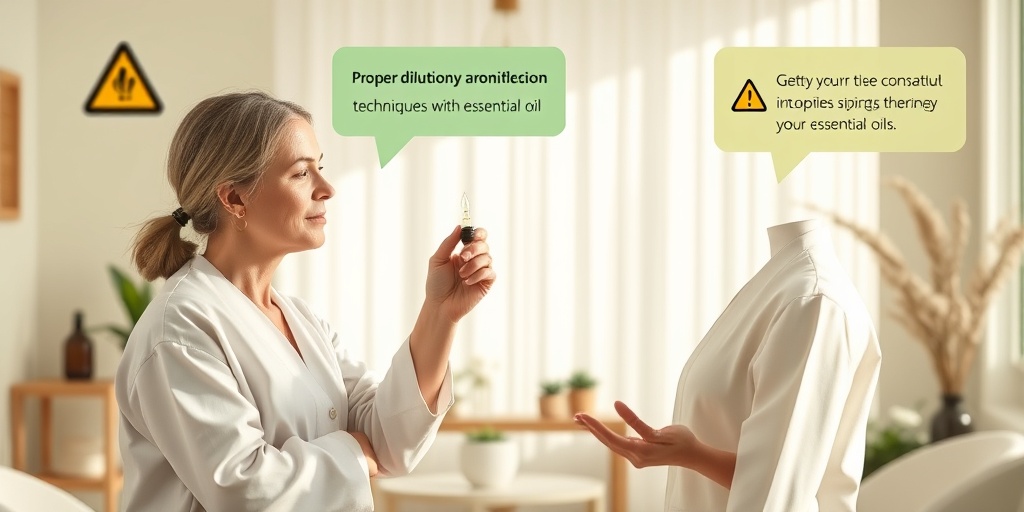
Aromatherapy for Stress Relief
In today’s fast-paced world, stress has become a common companion for many. Fortunately, aromatherapy (essential oils therapy) offers a natural and effective way to combat stress and promote relaxation. By harnessing the power of essential oils, individuals can create a calming environment that soothes the mind and body.
What is Aromatherapy?
Aromatherapy is a holistic healing practice that utilizes the aromatic properties of essential oils extracted from plants. These oils can be inhaled, applied topically, or used in diffusers to create a therapeutic atmosphere. The scents of these oils can trigger emotional responses and influence physical well-being, making them a powerful tool for stress relief.
How Aromatherapy Helps with Stress
Essential oils have been shown to have various effects on the body and mind. Here are some ways aromatherapy can help alleviate stress:
- Reduces Anxiety: Certain essential oils, such as lavender and chamomile, are known for their calming properties. Inhaling these scents can help lower anxiety levels and promote a sense of peace.
- Improves Sleep Quality: Stress often disrupts sleep patterns. Oils like bergamot and sandalwood can help relax the mind, making it easier to fall asleep and stay asleep.
- Enhances Mood: Citrus oils, such as lemon and orange, can uplift your mood and provide an energizing effect, counteracting feelings of stress and fatigue.
Popular Essential Oils for Stress Relief
When it comes to choosing essential oils for stress relief, here are some popular options:
- Lavender: Known for its calming effects, lavender oil is often used to reduce anxiety and promote relaxation.
- Frankincense: This oil is believed to help ground emotions and enhance meditation practices.
- Ylang Ylang: With its sweet floral scent, ylang ylang can help lower blood pressure and reduce stress levels.
- Rose: The soothing aroma of rose oil can help alleviate feelings of sadness and anxiety.
How to Use Aromatherapy for Stress Relief
Incorporating aromatherapy into your daily routine can be simple and enjoyable. Here are some effective methods:
- Diffusion: Use an essential oil diffuser to disperse the scent throughout your living space. This method is great for creating a calming atmosphere.
- Topical Application: Dilute essential oils with a carrier oil and apply them to pulse points, such as wrists and temples, for immediate stress relief.
- Bath Soak: Add a few drops of your favorite essential oil to a warm bath for a relaxing soak that can melt away tension.
Aromatherapy in Daily Life
Aromatherapy can seamlessly integrate into your daily routine, enhancing your overall well-being. By making small adjustments, you can create a more peaceful and balanced environment.
Morning Routine
Start your day on a positive note by incorporating essential oils into your morning routine. Consider using invigorating scents like peppermint or citrus oils to energize your mind and body. A few drops in your shower or a quick inhalation from a bottle can set a refreshing tone for the day ahead. 🌞
Workplace Wellness
Stress at work is a common issue, but aromatherapy can help create a more pleasant atmosphere. Here are some tips for using essential oils in the workplace:
- Personal Diffuser: Carry a personal diffuser or essential oil roller to use during breaks. Scents like lemon or eucalyptus can help clear your mind and boost productivity.
- Desk Sprays: Create a calming desk spray with essential oils like lavender or chamomile to spritz around your workspace.
Evening Wind Down
As the day comes to a close, it’s essential to unwind and prepare for restful sleep. Incorporate calming essential oils into your evening routine:
- Bedtime Ritual: Use a diffuser with lavender or cedarwood oil in your bedroom to create a serene environment.
- Massage: Consider a gentle self-massage with diluted essential oils to release tension from the day.
Travel Companion
Traveling can be stressful, but aromatherapy can help ease anxiety during trips. Pack essential oils in your carry-on to use during flights or long drives. Scents like peppermint can help with motion sickness, while lavender can promote relaxation in unfamiliar environments. ✈️
Incorporating aromatherapy (essential oils therapy) into your daily life can significantly enhance your well-being. By understanding how to use essential oils effectively, you can create a more balanced and stress-free lifestyle. 🌿
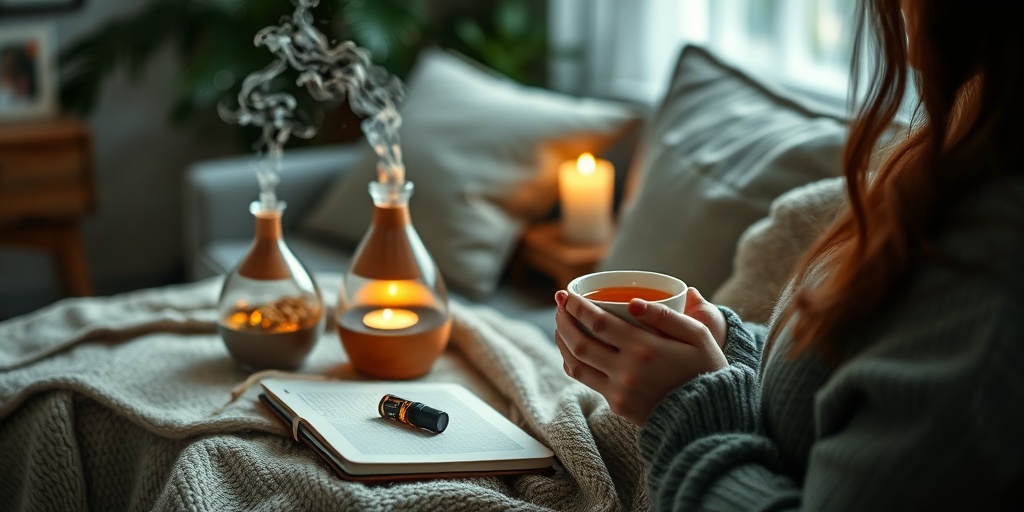
Frequently Asked Questions about Aromatherapy (Essential Oils Therapy)
What is Aromatherapy?
Aromatherapy, also known as essential oils therapy, is a holistic healing practice that utilizes the natural fragrances of essential oils extracted from plants to promote physical and emotional well-being.
How do I use Aromatherapy Essential Oils?
There are several ways to incorporate aromatherapy essential oils into your routine:
- Diffusion: Use an essential oil diffuser to disperse the oils into the air.
- Topical Application: Dilute essential oils with a carrier oil and apply them to the skin.
- Inhalation: Inhale the scent directly from the bottle or from a cotton ball.
- Bathing: Add a few drops of essential oils to your bath for a relaxing experience.
Are Essential Oils Safe for Aromatherapy?
While many essential oils are safe for use, it is important to follow guidelines for aromatherapy. Always dilute essential oils before applying them to the skin, and consult with a healthcare professional if you have any underlying health conditions or are pregnant. 🩺
Can Aromatherapy Help with Anxiety?
Yes, aromatherapy can be a supportive therapy for anxiety. Certain essential oils, such as lavender and chamomile, are known for their calming properties and can help reduce stress and promote relaxation. 🌿
What are the Best Essential Oils for Aromatherapy?
Some popular essential oils used in aromatherapy include:
- Lavender: Known for its calming effects.
- Peppermint: Refreshing and invigorating.
- Eucalyptus: Great for respiratory support.
- Tea Tree: Known for its antiseptic properties.
Can I Use Aromatherapy for Everyday Stress Relief?
Absolutely! Incorporating aromatherapy into your daily routine can help manage stress levels. Consider using essential oils during meditation, yoga, or even while working to create a calming environment. 🧘♀️
Is Aromatherapy Suitable for Children?
While some essential oils can be safe for children, it is crucial to use them with caution. Always consult with a pediatrician before using aromatherapy for children, and opt for oils that are specifically recommended for their age group.
Where Can I Buy Quality Essential Oils?
Quality essential oils can be purchased from health food stores, specialty shops, or online retailers. Look for brands that provide information on sourcing and purity to ensure you are getting high-quality products.
Can Aromatherapy Be Used Alongside Other Treatments?
Yes, aromatherapy can be used as a complementary therapy alongside other treatments. However, it is essential to discuss this with your healthcare provider to ensure it aligns with your overall treatment plan.

